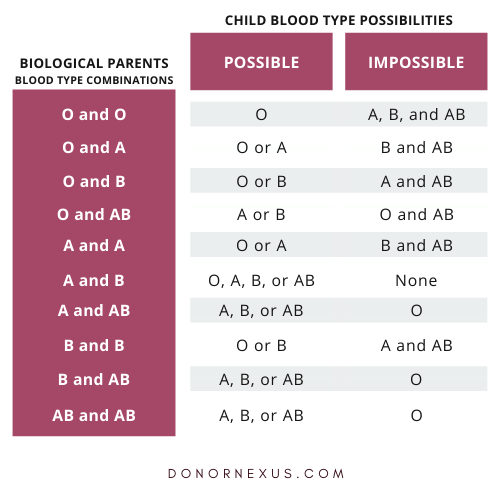 May 14, 2020 | by Donor Nexus
May 14, 2020 | by Donor Nexus
You’ve narrowed down your egg donor search, finding the perfect egg donor who has all the characteristics you’ve been looking for. Then you realize there are many other aspects to consider, such as the egg donor’s blood type, and wonder if you need to factor that into your decision-making. Does the egg donor’s blood type matter? Interestingly, the answer is no. The donor blood type does not impact the outcome of the IVF cycle or the health of the child. One less decision for you to worry about!
“The egg donor blood type does not impact the outcome of the IVF cycle or the health of the child.”
What about when using donor embryos?
Similar to donor egg blood type, the blood type of the donor embryo does not affect the outcome of the cycle. However, in the less common situations where the recipient mother’s blood type is Rh negative and the embryo’s blood type is Rh positive, the obstetrician will administer a RhoGAM shot to the recipient mother. RhoGAM prevents the Rh-negative mother from making antibodies during her pregnancy.
Why does blood type matter to some intended parents?
The egg donor’s blood type is important to intended parents who are not planning on telling their child that they were conceived with the help of an egg donor. This concern is due to the possibility of the child inheriting a specific blood type from the egg donor that is not a possible combination of the intended mother's and intended father’s blood types.
We understand that this is a personal decision that may be influenced by religious and cultural factors among others. Ultimately, we respect that the intended parents will make the decision that is right for their family.
The Donor Nexus egg donor database features healthy egg donors who are available to be matched with intended parents! If the egg donor’s blood type is known, it will be listed in their profile.
Blood type inheritance: how does it work?
Now, let’s review how blood types work and how the offspring's blood type is determined.
Every person has a specific blood type. As explained by the American Red Cross, “In addition to the A and B antigens, there is a protein called the Rh factor, which can be either present (+) or absent (-), creating the 8 most common blood types (A+, A-, B+, B-, O+, O-, AB+, AB-).”
Similar to characteristics like eye color or hair color, our blood type is also inherited from our parents. Each biological parent contributes one of two ABO genes to the offspring -- the A and B genres are dominant and the O gene is recessive. For instance, a mother with O blood type can only pass an O allele to her offspring. A father with blood type AB could pass either an A or B allele. The possible blood types of this offspring would be A or B.
Each biological parent carries two alleles for both blood group and Rh factor, of which only one is passed onto their offspring. Since there are 4 different maternal blood types and 4 different paternal blood types possible, there are 16 different combinations to consider when predicting the blood type of children.
The chart below displays possible blood types for children based on possible combinations of biological mother and biological father blood types.

As you can see, children do not always inherit the same blood types as their biological parents. However, as discussed above, there are certain instances in which the donor’s blood type could cause the offspring to inherit a blood type that would be an impossible inheritance from the biological parents alone.
Since the blood type of the egg donor or donor embryo does not impact the outcome of the cycle or the health of the child, we generally encourage intended parents to not worry about the donor’s blood type.
In closing, we encourage you not to worry about the blood type of the egg donor as it could hinder you from matching with the perfect donor. For couples or individuals to whom the donor blood type is important, we can assist you in finding an egg donor with your desired blood type. If you have any additional questions, contact us today and we will be happy to provide you with more information.
Disclaimer: The information on this page is based on theoretical principles and should not be used to make any conclusions about your family’s blood grouping. We recommend you consult with your health physician in addition to conducting your own research.
Find More Resources in the Donor Nexus Blog:
• Epigenetics Using Donor Eggs: Exploring the Connection
• Does Egg Donor Eye Color Matter?
• 4 Tips on Choosing an Egg Donor from a Mother via Donor Eggs
Donor Database
Register now to receive free and instant access to our online donor database
GET STARTED »
Because of you, we have her...
“This was truly an amazing process. In fact, we are thinking about doing it again in the future, if possible. Thank you for existing, because of you, we have her!”
– Intended Parent S.V.


